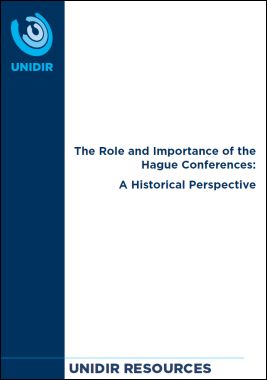A period of sustained efforts to codify and develop the rules of war, which began in the mid-nineteenth century, peaked with the 1899 and 1907 Hague Peace Conferences. Participating delegates adopted numerous binding instruments covering various aspects of peaceful dispute settlement and war-fighting.
This paper places the two Hague Peace Conferences within the context of humanity’s attempts to regulate warfare. It identifies the main factors that made them successful at the time; shows how these factors have changed over time; and assesses the conferences’ contemporary relevance in view of such changes.
This paper was presented at the Conference on Disarmament, Informal Plenary, 22 February 2017.
Citation: Nobuo Hayashi (2017) "The Role and Importance of the Hague Conferences: A Historical Perspective", UNIDIR, Geneva.
